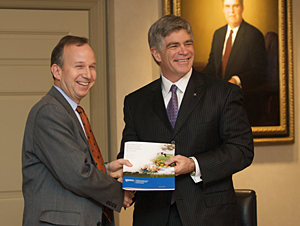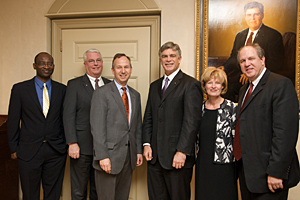

ADVERTISEMENT
- Rozovsky wins prestigious NSF Early Career Award
- UD students meet alumni, experience 'closing bell' at NYSE
- Newark Police seek assistance in identifying suspects in robbery
- Rivlin says bipartisan budget action, stronger budget rules key to reversing debt
- Stink bugs shouldn't pose problem until late summer
- Gao to honor Placido Domingo in Washington performance
- Adopt-A-Highway project keeps Lewes road clean
- WVUD's Radiothon fundraiser runs April 1-10
- W.D. Snodgrass Symposium to honor Pulitzer winner
- New guide helps cancer patients manage symptoms
- UD in the News, March 25, 2011
- For the Record, March 25, 2011
- Public opinion expert discusses world views of U.S. in Global Agenda series
- Congressional delegation, dean laud Center for Community Research and Service program
- Center for Political Communication sets symposium on politics, entertainment
- Students work to raise funds, awareness of domestic violence
- Equestrian team wins regional championship in Western riding
- Markell, Harker stress importance of agriculture to Delaware's economy
- Carol A. Ammon MBA Case Competition winners announced
- Prof presents blood-clotting studies at Gordon Research Conference
- Sexual Assault Awareness Month events, programs announced
- Stay connected with Sea Grant, CEOE e-newsletter
- A message to UD regarding the tragedy in Japan
- More News >>
- March 31-May 14: REP stages Neil Simon's 'The Good Doctor'
- April 2: Newark plans annual 'wine and dine'
- April 5: Expert perspective on U.S. health care
- April 5: Comedian Ace Guillen to visit Scrounge
- April 6, May 4: School of Nursing sponsors research lecture series
- April 6-May 4: Confucius Institute presents Chinese Film Series on Wednesdays
- April 6: IPCC's Pachauri to discuss sustainable development in DENIN Dialogue Series
- April 7: 'WVUDstock' radiothon concert announced
- April 8: English Language Institute presents 'Arts in Translation'
- April 9: Green and Healthy Living Expo planned at The Bob
- April 9: Center for Political Communication to host Onion editor
- April 10: Alumni Easter Egg-stravaganza planned
- April 11: CDS session to focus on visual assistive technologies
- April 12: T.J. Stiles to speak at UDLA annual dinner
- April 15, 16: Annual UD push lawnmower tune-up scheduled
- April 15, 16: Master Players series presents iMusic 4, China Magpie
- April 15, 16: Delaware Symphony, UD chorus to perform Mahler work
- April 18: Former NFL Coach Bill Cowher featured in UD Speaks
- April 21-24: Sesame Street Live brings Elmo and friends to The Bob
- April 30: Save the date for Ag Day 2011 at UD
- April 30: Symposium to consider 'Frontiers at the Chemistry-Biology Interface'
- April 30-May 1: Relay for Life set at Delaware Field House
- May 4: Delaware Membrane Protein Symposium announced
- May 5: Northwestern University's Leon Keer to deliver Kerr lecture
- May 7: Women's volleyball team to host second annual Spring Fling
- Through May 3: SPPA announces speakers for 10th annual lecture series
- Through May 4: Global Agenda sees U.S. through others' eyes; World Bank president to speak
- Through May 4: 'Research on Race, Ethnicity, Culture' topic of series
- Through May 9: Black American Studies announces lecture series
- Through May 11: 'Challenges in Jewish Culture' lecture series announced
- Through May 11: Area Studies research featured in speaker series
- Through June 5: 'Andy Warhol: Behind the Camera' on view in Old College Gallery
- Through July 15: 'Bodyscapes' on view at Mechanical Hall Gallery
- More What's Happening >>
- UD calendar >>
- Middle States evaluation team on campus April 5
- Phipps named HR Liaison of the Quarter
- Senior wins iPad for participating in assessment study
- April 19: Procurement Services schedules information sessions
- UD Bookstore announces spring break hours
- HealthyU Wellness Program encourages employees to 'Step into Spring'
- April 8-29: Faculty roundtable series considers student engagement
- GRE is changing; learn more at April 15 info session
- April 30: UD Evening with Blue Rocks set for employees
- Morris Library to be open 24/7 during final exams
- More Campus FYI >>
4:17 p.m., March 23, 2011----University of Delaware President Patrick Harker presented the results of a recent UD study noting the impact of agriculture to Delaware's economy to Delaware Gov. Jack Markell on Wednesday, March 23.
The study, conducted by UD faculty members Tom Ilvento and Titus Awokuse of the Department of Food and Resource Economics, found Delaware agriculture to have roughly an $8 billion impact on the state's economy, up from the previously used figure of $1 billion.
“Agriculture is important to our economy and important to our future,” said Markell. “Farming and related agri-business generate tens of thousands of jobs and my job is to help keep our agriculture industry strong and growing. We are doing all we can to support the poultry producing industry in Delaware and helping to create conditions that will increase sales and exports, including exports to other countries.”
Markell called the report a great resource and said that having this research data at their disposal will help “policy makers throughout Delaware understand that this is something critically important to our state's past, present and future.”
Meeting with Markell and Harker, were Delaware Secretary of Agriculture Ed Kee and Robin Morgan, dean of the College of Agriculture and Natural Resources (CANR).
Harker said the study “captures the vibrancy of the state's agricultural sector, its economic power, and its central place in our daily lives.” Stressing that though the economic component is no doubt a very important aspect of agriculture, Harker said that people should also focus on agriculture's “amazing potential for better human health, food safety and security, clean air, clean water, clean energy, and healthy ecosystems.”
Harker noted that CANR is focused on these things every day. He said, “Agriculture is a critical piece of Delaware's future and America's future, and I'm thrilled that this report illustrates just how dynamic and vital it is.”
Morgan said that before the study was conducted, the industry was credited with only $1.1 billion in contributions to Delaware's economy, a number Morgan explained as the total market value of agricultural products sold from farms in Delaware.
Upon further examination of the components of Delaware's gross domestic product (GDP), Morgan noted that manufacturing accounted for roughly 7.7 percent of Delaware's GDP while agriculture accounted for less than 1 percent.
“We wondered what Delaware was manufacturing, and when we examined the data, we discovered that a large portion of Delaware manufacturing was chickens and the feed that they eat,” Morgan said.
All of the things that go into the processing of chickens and feed were not being included in Delaware's farm gate statistics, and after seeing this, Morgan asked Ilvento and Awokuse to complete a comprehensive review and break out the statistics by commodity, by county, by production and by processing.
Poultry, while certainly the mainstay of Delaware's agricultural economy, was just a piece of the pie. The end result was a significant change in the contributions of agriculture to Delaware's economy -- from $1 billion to $7.95 billion.
Kee noted that the study is important not only because it provides new data and information, but also because “behind every statistic, behind every piece of data, is a person.” He thanked those involved in the study for “capturing that human story by capturing the value of the industry.”
Key findings of the report:
In 2008, the total economic contribution of all categories of agriculture in Delaware was $7.95 billion in industry output.
The agricultural industry contributes $2.5 billion in value added activity and $1.6 billion in labor income.
The total estimated number of jobs supported by the agricultural industry in Delaware was about 30,000 in 2008.
The poultry industry alone produces an industry output of $3.2 billion, 13,437 jobs, and $911.6 million in value added. In comparison, fruit and vegetable production and processing account for $179 million, 754 jobs, and $67.5 million in value added activities.
Sussex County generates an industry output of $3.78 billion and a total of 15, 378 jobs; Kent accounts for $2.64 billion and 8, 502 jobs, with New Castle contributing $1.2 billion and 4,448 jobs.
For a copy of the report, click here.


